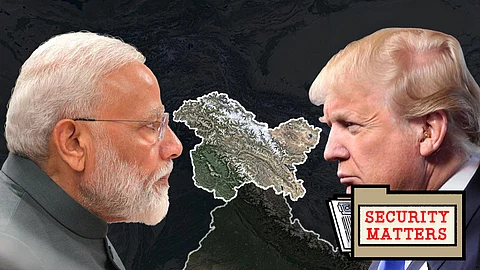SOURCE: The Tribune

The Afghan peace deal has been signed in Qatar’s capital Doha. A long wait has ended, but the doubts still lurk whether it will live up to its expectations. It also has regional fallout, and if the deal goes astray, Kashmir would be at the receiving end.
All the arguments that Taliban was never involved in Kashmir get automatically demolished as the IC 814 hijacking and its bad deal was a joint operation of Al-Qaeda and Taliban and the elements who helped the terror demagogue, now listed as international terrorist Masood Azhar, to set up new terror network Jaish-e-Mhammad (JeM) that has been bleeding India and Indians since its birth in early 2000.
Masood Azhar was one of the three terrorists set free and ferried to Kandahar, Afghanistan, on December 31, 1999, in exchange of the crew and passengers of the hijacked airliner. Masood was freed from Kot Bhalwal Jail, Jammu. The JeM has been found guilty of the attacks at the J&K state legislative Assembly on October 1, 2001, and December 13, 2001 assault on the Indian Parliament. The latest act of terror recorded against its exploits is the February 14, 2019, Pulwama attack in which 40 CRPF personnel were killed.
And, the calendar shows that Kashmir militancy erupted with the active help of Pakistan only after the “Mujahedeen” had driven away the Soviet forces from Afghanistan with funding from America. Pakistan was outsourced the task to generate and train the groups to fight Russians.
Later, Pakistan used this terror-training and setting up its foreign policy goals by mounting terror attacks in Kashmir. It is a globally known fact. Pakistan has neither changed its mindset, nor the designs to bleed India. It is clear the way Pakistan been active in its anti-India rhetoric and action with Kashmir being at the core of its narrative.
“It is a known fact that Taliban is a puppet of Pakistan, and it will behave the way Pakistan would direct it,” observed former DGP of J&K SP Vaid, who had handled Masood Azhar, when he was in custody in J&K.
“The success or the failure of the deal depends on the way Taliban behaves and lives up to its commitment,” Vaid said.
The US has signed this deal in Doha to safeguard its own national interest, primarily to bring back its young men fighting Taliban back home. This “national interest” is America-specific. It is critical part of the February 29, 2020, Agreement. There is no detailed illustration of how other countries would be saved from the feared violence by Taliban and Pakistan.
“The terrorist launch pads in Pakistan-occupied Kashmir are full and the Pakistan army is trying its best to infiltrate maximum infiltrators into the Valley, to disrupt the peace,” Lt-Gen KJS Dhillon, Corps Commander of 15 Corps, heading troops in Kashmir, had told The Tribune in an interview last week.
By all other accounts, it is also clear that some of them are battle hardened and they had their training in Afghanistan. The training centres of Kashmiri militant groups and others who operated in Kashmir were set up in Afghanistan in 1990s, and these came to the international attention when America had fired missiles in August in retaliation to bombing of its embassies in Tanzania and Kenya in which more than 200 personnel, including US personnel were killed.
That offers a clear sign how the things can go wrong, if the US doesn’t pin down Taliban to its commitments firmly.
from Indian Defence Research Wing https://ift.tt/3cdu2uq
via IFTTThttp://idrw.org
No comments:
Post a Comment